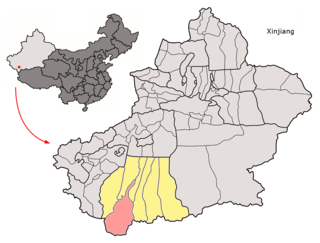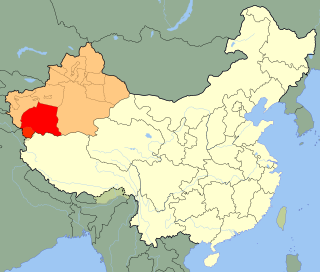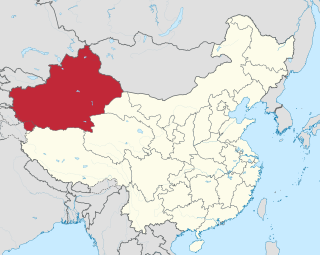Related Research Articles
Terrorism in China refers to the use or threatened use of violence to effect political or ideological change in the People's Republic of China. The definition of terrorism differs among scholars, between international and national bodies and across time and there is no legally binding definition internationally. In the cultural setting of China, the term is relatively new and ambiguous.
The July 2009 Ürümqi riots were a series of violent riots over several days that broke out on 5 July 2009 in Ürümqi, the capital city of the Xinjiang Uyghur Autonomous Region (XUAR), in northwestern China. The first day's rioting, which involved at least 1,000 Uyghurs, began as a protest, but escalated into violent attacks that mainly targeted Han people. A total of 197 people died, most of whom were Han people or non-Muslim minorities, with 1,721 others injured and many vehicles and buildings destroyed. Many Uyghurs disappeared during wide-scale police sweeps in the days following the riots; Human Rights Watch (HRW) documented 43 cases and said figures for real disappearances were likely to be much higher.
The Shaoguan incident was a civil disturbance which took place overnight on 25/26 June 2009 in Guangdong, China. A violent dispute erupted between migrant Uyghurs and Han Chinese workers at a toy factory in Shaoguan as a result of false allegations of the sexual assault of a Han Chinese woman. Groups of Han Chinese set upon Uyghur co-workers, leading to at least two Uyghurs being violently killed by angry Han Chinese men, and some 118 people injured, most of them Uyghurs.
In September 2009, Ürümqi, the capital of the Xinjiang Uyghur Autonomous Region in the People's Republic of China, experienced a period of unrest in the aftermath of the July 2009 Ürümqi riots. Late August and early September saw a series of syringe attacks on civilians. In response to the attacks, thousands of residents held protests for several days, resulting in the deaths of five people. In addition, the arrest and beating of several Hong Kong journalists during the protests attracted international attention.

The 2011 Hotan attack was a bomb-and-knife attack that occurred in Hotan, Xinjiang, China on July 18, 2011. According to witnesses, the assailants were a group of 18 young Uyghur men who opposed the local government's campaign against the burqa, which had grown popular among older Hotan women in 2009 but were also used in a series of violent crimes. The men occupied a police station on Nuerbage Street at noon, killing two security guards with knives and bombs and taking eight hostages. The attackers then yelled religious slogans, including ones associated with Jihadism, as they replaced the Chinese flag on top of a police station with another flag, the identity of which is disputed.

The 2011 Kashgar attacks were a series of knife and bomb attacks in Kashgar, Xinjiang, China on July 30 and 31, 2011. On July 30, two Uyghur men hijacked a truck, killed its driver, and drove into a crowd of pedestrians. They got out of the truck and stabbed six people to death and injured 27 others. One of the attackers was killed by the crowd; the other was brought into custody. On July 31, a chain of two explosions started a fire at a downtown restaurant. A group of armed Uyghur men killed two people inside of the restaurant and four people outside, injuring 15 other people. Police shot five suspects dead, detained four, and killed two others who initially escaped arrest.

The Pishan hostage crisis occurred on the night of December 28, 2011, in Koxtag, Pishan/Guma County, Hotan Prefecture, Xinjiang Uygur Autonomous Region, China. A group of 15 Uyghur youths kidnapped two goat shepherds for directions. They were soon confronted by a group of five Pishan policemen, who tried to negotiate for the shepherds' release. The group attacked the policemen with knives, killing one and injuring another. The police shot back, killing seven hostage-takers, wounding and capturing four, freeing the two shepherds. The Xinjiang government called the kidnappers "violent terrorists", while a Uyghur exile group claimed the kidnappers' actions were the result of "police repression".

The Baren Township conflict was an armed conflict that took place between ethnic Uyghur militants and Chinese government forces in April 1990. It is unclear what happened during the armed conflict because reports of the incident vary greatly.

Tianjin Airlines Flight 7554 was a scheduled passenger flight between Hotan and Ürümqi in China's Xinjiang Autonomous Region. The aircraft operating this route on 29 June 2012, an Embraer 190, took off from Hotan at 12:25 pm; within ten minutes, six ethnic Uyghur men, one of whom allegedly professed his motivation as jihad, announced their intent to hijack the aircraft, according to multiple witnesses. In response, passengers and crew resisted and successfully restrained the hijackers, who were armed with aluminium crutches and explosives.
The 2012 Yecheng attack was a terrorist attack by Uyghur separatist extremists that occurred on February 28, 2012, in Yecheng, Xinjiang, a remote town situated about 150 miles from China's border with Pakistan. Details of the attack are disputed: according to Chinese government reports and court documents, at around 6 p.m. that day, a group of eight Uyghur men led by religious extremist Abudukeremu Mamuti attacked pedestrians with axes and knives on Happiness Road. Local police fought with the attackers, ultimately killing all and capturing Mamuti. State-run media reported that one police officer died and four police were injured, while 15 pedestrians died from Mamuti's assault and 14 more civilians were injured. Chinese officials characterized the event as a "terrorist attack."
On 24 April 2013, ethnic clashes occurred in Marelbeshi (Bachu), Xinjiang, China. The violence left at least 21 people dead, including 15 police and officials.

The Xinjiang conflict, also known as the East Turkistan conflict, Uyghur–Chinese conflict or Sino-East Turkistan conflict, is an ongoing ethnic geopolitical conflict in what is now China's far-northwest autonomous region of Xinjiang also known as East Turkistan. It is centred around the Uyghurs, a Turkic ethnic group who constitute a plurality of the region's population.
On 26 June 2013, rioting broke out in Shanshan County, in the autonomous region of Xinjiang, China. 35 people died in the riots, including 22 civilians, two police officers and eleven attackers.
Events in the year 2014 in China.
On the early morning of Wednesday, 30 July 2014, Juma Tahir, the imam of China's largest mosque, the Id Kah Mosque in northwestern Kashgar, was stabbed to death by three young male Uyghur extremists. Religious leaders across denominations condemned the attack.
The Yarkand Massacre was an episode of violence that began on 28 July 2014 in Yarkant County, Kashgar Region of the Xinjiang Uyghur Autonomous Region, China, and lasted for several days, as Chinese police quelled the local unrest. While Chinese state media reported a few dozen fatalities, independent estimates range from hundreds to thousands.

The 2015 Aksu colliery attack took place on 18 September 2015, when a group of terrorists, suspected to be Uyghurs, attacked workers and security guards at a coal mine in Aksu City, Xinjiang, leaving at least 16 dead and 18 wounded according to government sources, with other estimates reaching as high as 50 dead and 50 wounded. When local police arrived at the scene, the attackers rammed the police's vehicles before fleeing into the mountains. The majority of the victims of the attack were members of the Han ethnic group.
The 2014 Yarkant attacks occurred in Yarkant County in Xinjiang on 28 July. Authorities stated that an armed gang of masked militants carried out attacks against civilians as well as local police across towns in the county.
References
- ↑ "Region's residents bear scars of terrorist attacks" . Retrieved 1 February 2023.
- 1 2 "China says 40 'rioters' killed in restive Xinjiang". AFP. Retrieved 1 February 2023.
- ↑ "Chinese State Media Now Put Death Toll From Xinjiang Violence at 50". TIME. Retrieved 2 February 2023.
- 1 2 "China: 'Serious' Terrorist Attack Kills 50 In Xinjiang". NPR. National Public Radio. September 26, 2014. Retrieved 17 January 2023.
- 1 2 "Official Death Toll in Xinjiang's Bugur Violence Climbs to 50". Radio Free Asia. Retrieved 2 February 2023.
- ↑ "Xinjiang unrest: China raises death toll to 50". BBC. Retrieved 5 February 2023.
- ↑ "China says 50 killed in Sunday terrorist attack". The Times of Israel. Retrieved 2 February 2023.